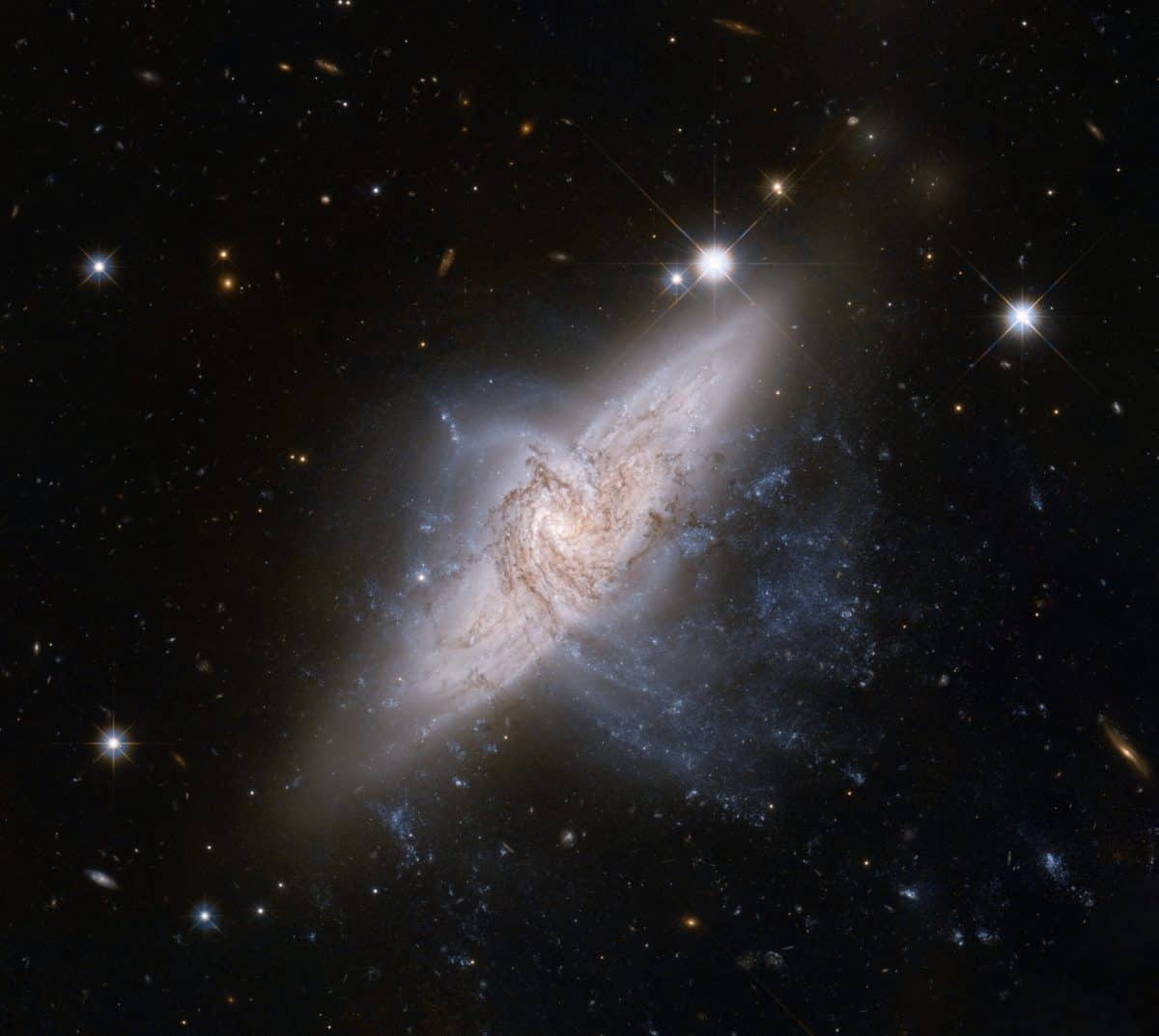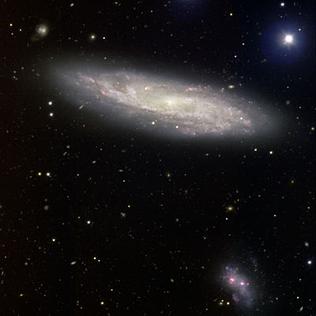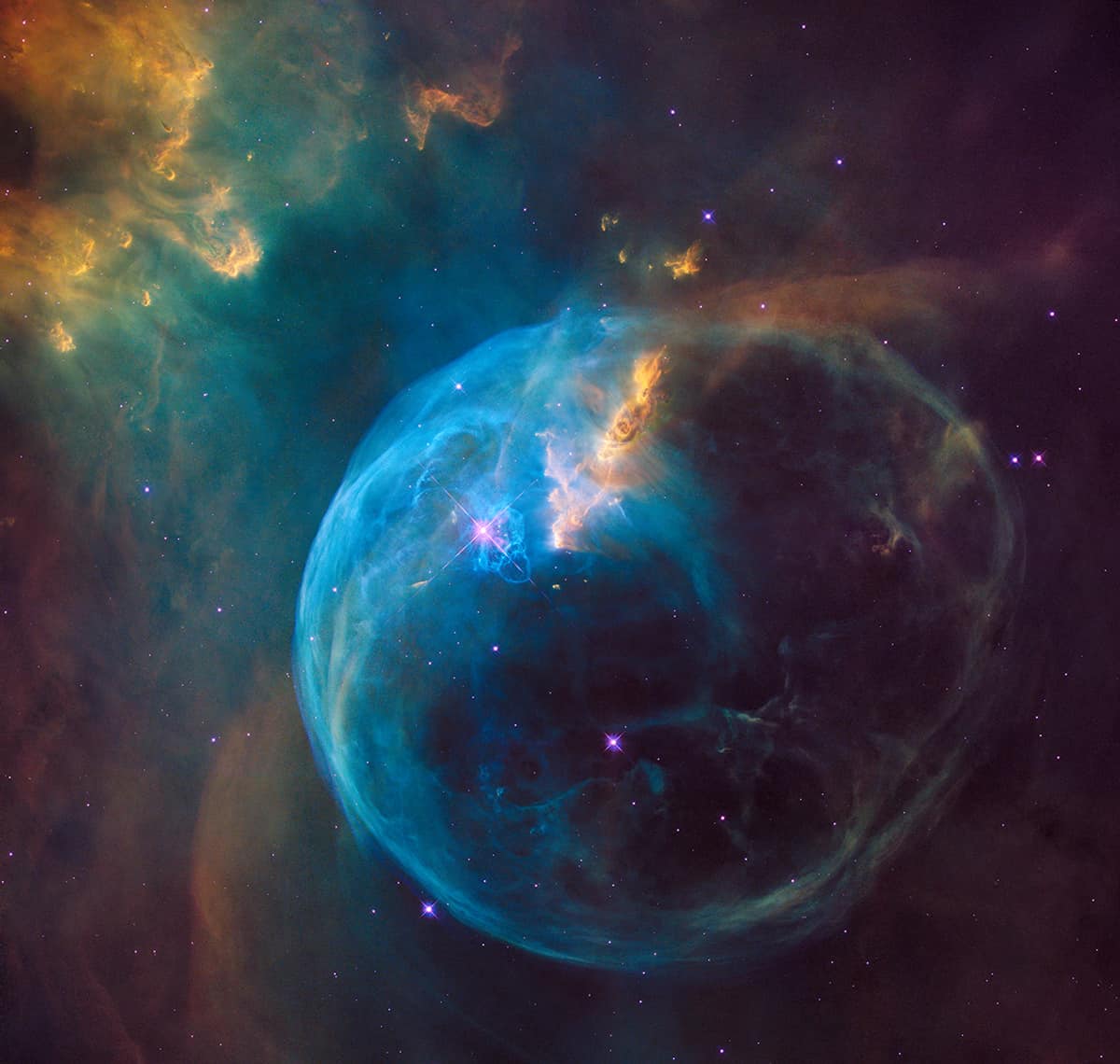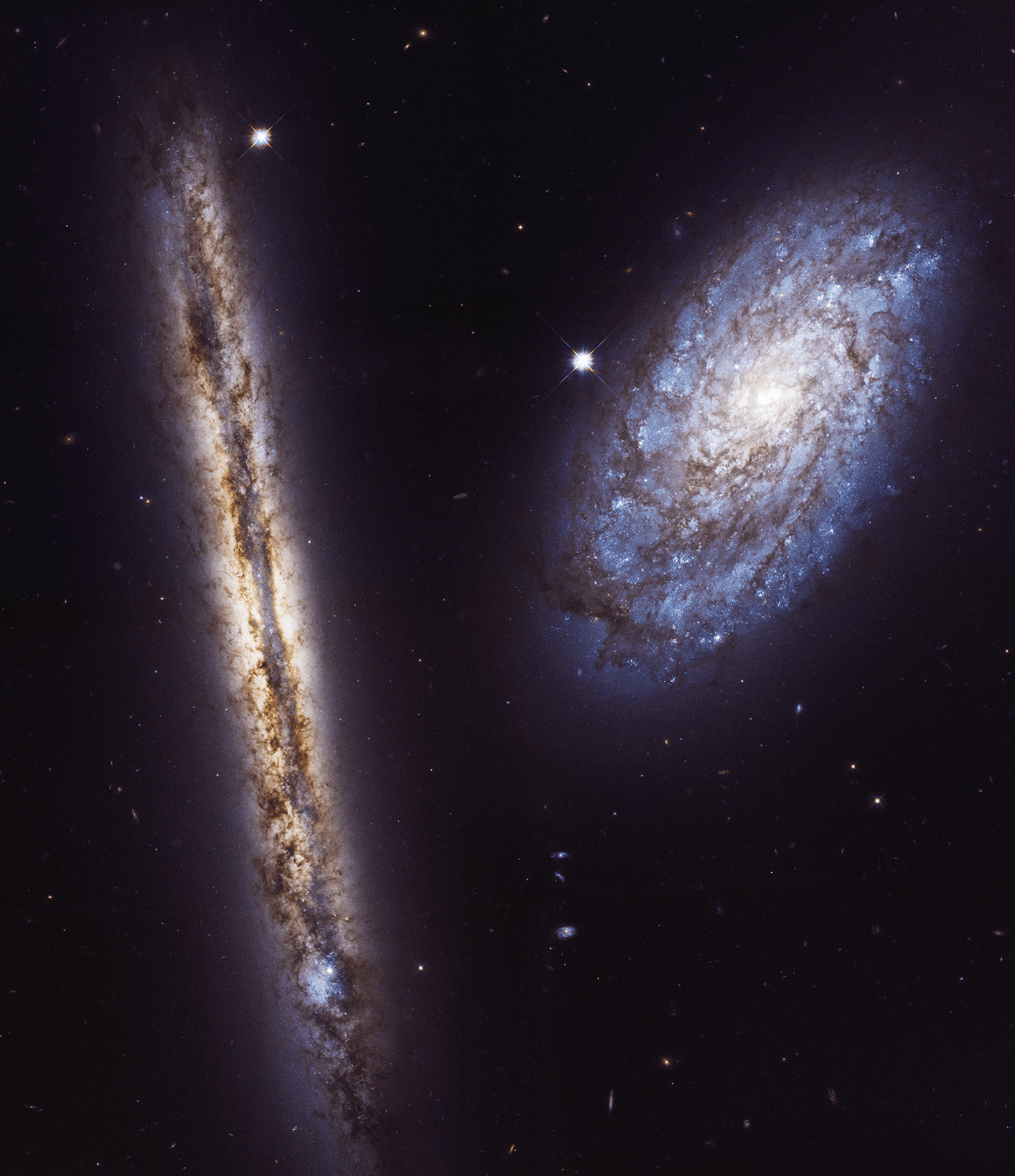Blog
World Music on Flamenco Fridays with María Terremoto, who at just 18 years old has already become an indispensable artist within the genre.
more...Call On Jah
more...NGC 3314 is a pair of overlapping spiral galaxies between 117 and 140 million light-years away in the constellation Hydra. This unique alignment gives astronomers the opportunity to measure the properties of interstellar dust in the face-on foreground galaxy (NGC3314a), which appear dark against the background galaxy (NGC 3314b). Unlike interacting galaxies, the two components of NGC3314 are physically unrelated. It was discovered in April 1999.
In a March 2000 observation of the galaxies, a prominent green star-like object was seen in one of the arms. Astronomers theorized that it could have been a supernova, but the unique filtering properties of the foreground galaxy made it difficult to decide definitively.
more...Herbert Jeffrey “Herbie” Hancock (born April 12, 1940) is an American pianist, keyboardist, bandleader, composer and actor. Starting his career with Donald Byrd, he shortly thereafter joined the Miles Davis Quintet where Hancock helped to redefine the role of a jazz rhythm section and was one of the primary architects of the post-bop sound. Hancock’s music is often melodic and accessible; he has had many songs “cross over” and achieve success among pop audiences.
Hancock’s best-known compositions include “Cantaloupe Island“, “Watermelon Man” (later performed by dozens of musicians, including bandleader Mongo Santamaría), “Maiden Voyage“, “Chameleon“, and the singles “I Thought It Was You” and “Rockit“. His 2007 tribute album River: The Joni Letters won the 2008 Grammy Award for Album of the Year, only the second jazz album ever to win the award, after Getz/Gilberto in 1965.
Hancock was born in Chicago, Illinois, the son of Winnie Belle (Griffin), a secretary, and Wayman Edward Hancock, a government meat inspector.His parents named him after the singer and actor Herb Jeffries. He attended the Hyde Park Academy.[4] Like many jazz pianists, Hancock started with a classical music education. He studied from age seven, and his talent was recognized early. Considered a child prodigy, he played the first movement of Mozart‘s Piano Concerto No. 26 in D Major, K. 537 (Coronation) at a young people’s concert on February 5, 1952, with the Chicago Symphony Orchestra (led by CSO assistant conductor George Schick) at the age of 11.
more...Theodore Roosevelt “Hound Dog” Taylor (April 12, 1915 – December 17, 1975) was an American Chicago blues guitarist and singer.
Taylor was born in Natchez, Mississippi, in 1915, though some sources say 1917. He initially played the piano and began playing the guitar when he was 20. He moved to Chicago in 1942.
He was famous among guitar players for having six fingers on both hands, a condition called polydactyly. As is usual with the condition, the extra digits were rudimentary nubbins and could not be moved. One night, while drunk, he cut off the extra digit on his right hand using a straight razor.
He became a full-time musician around 1957 but remained unknown outside the Chicago area, where he played small clubs in black neighborhoods and at the open-air Maxwell Street Market. He was known for his electrified slide guitar playing (roughly styled after that of Elmore James), his cheap Japanese Teisco guitars, and his raucous boogie beats.
In 1967, Taylor toured Europe with the American Folk Blues Festival, performing with Little Walter and Koko Taylor. After hearing Taylor with his band, the HouseRockers (Brewer Phillips on second guitar and Ted Harvey on drums) in 1970 at Florence’s Lounge on Chicago’s South Side, Bruce Iglauer (then a shipping clerk for Delmark Records) tried to persuade his employer to sign Taylor to a recording contract. In 1971, having no success in getting Delmark to sign Taylor, Iglauer used a $2500 inheritance to form Alligator Records, which recorded Taylor’s debut album, Hound Dog Taylor and the HouseRockers.
more...My Prayer
https://www.youtube.com/watch?v=AZeQ_nKA8Aw&index=15&list=PLEB3LPVcGcWZ0hsQ5_jgSMhawAnDzy1io
more...NGC 2770 is a type SASc spiral galaxy located about 88 million light years away, in the constellation Lynx. Three Type Ib supernovae have occurred there recently: SN 1999eh, SN 2007uy, and SN 2008D. The last of these is famous for being the first supernova detected by the X-rays released very early on in its formation, rather than by the optical light emitted during the later stages, which allowed the first moments of the outburst to be observed. It is possible that NGC 2770’s interactions with a suspected companion galaxy may have created the massive stars causing this activity.
SN 2015bh, a Type II supernova, was discovered in NGC 2770 in February 2015
more...Luther Johnson (born April 11, 1939, Itta Bena, Mississippi) is an American Chicago blues singer and guitarist, who performs under the name Luther “Guitar Junior” Johnson. He is not to be confused with Luther “Snake Boy” Johnson, Luther “Houserocker” Johnson, from Atlanta; or Lonnie “Guitar Junior” Brooks.
Johnson moved to Chicago with his family in 1955. During the 1960s, he performed with Magic Sam. He performed in Muddy Waters‘s band from 1972 to 1980. In 1980, four of his songs were included in an anthology released by Alligator Records. That same year he appeared as a member of the Legendary Blues Band, backing John Lee Hooker in the movie The Blues Brothers.
more...John Levy (April 11, 1912 – January 20, 2012) was an African-American jazz double-bassist and businessman.
Levy was born in New Orleans, Louisiana. In 1944, he left his family home in Chicago, Illinois, and moved to New York City, New York, where he played bass for such renowned jazz musicians as Ben Webster, Erroll Garner, Milt Jackson, and Billie Holiday. In 1949, he became the bassist in the original George Shearing Quintet, where he also acted as Shearing’s road manager. In 1951, Levy opened John Levy Enterprises, Inc., becoming the first African-American personal manager in the pop or jazz music field. By the 1960s, Levy’s client roster included Shearing, Nancy Wilson, Cannonball Adderley, Joe Williams, Shirley Horn, Soul singer Jimmie Raye, and Ramsey Lewis.
In 1997, Levy was inducted into the International Jazz Hall of Fame, and in 2006 he was named a Jazz Master by the National Endowment for the Arts. He died, aged 99, in Altadena, California.
more...Haitian singer
more...Chant Down Babylon
4-11-18
https://www.youtube.com/watch?v=v_eeEJg7DUE&list=PLEB3LPVcGcWZ0hsQ5_jgSMhawAnDzy1io&index=16
more...The Bubble Nebula, NGC 7635, is 7 light-years across – about one-and-a-half times the distance from our sun to its nearest stellar neighbor, Alpha Centauri – and resides 7,100 light-years from Earth in the constellation Cassiopeia.
The seething star forming this nebula is 45 times more massive than our sun. Gas on the star gets so hot that it escapes away into space as a “stellar wind” moving at over 4 million miles per hour. This outflow sweeps up the cold, interstellar gas in front of it, forming the outer edge of the bubble much like a snowplow piles up snow in front of it as it moves forward.
As the surface of the bubble’s shell expands outward, it slams into dense regions of cold gas on one side of the bubble. This asymmetry makes the star appear dramatically off-center from the bubble, with its location in the 10 o’clock position in the Hubble view.
Dense pillars of cool hydrogen gas laced with dust appear at the upper left of the picture, and more “fingers” can be seen nearly face-on, behind the translucent bubble.
The gases heated to varying temperatures emit different colors: oxygen is hot enough to emit blue light in the bubble near the star, while the cooler pillars are yellow from the combined light of hydrogen and nitrogen. The pillars are similar to the iconic columns in the “Pillars of Creation” in the Eagle Nebula. As seen with the structures in the Eagle Nebula, the Bubble Nebula pillars are being illuminated by the strong ultraviolet radiation from the brilliant star inside the bubble.
The Bubble Nebula was discovered in 1787 by William Herschel, a prominent British astronomer. It is being formed by an O star, BD +60°2522, an extremely bright, massive, and short-lived star that has lost most of its outer hydrogen and is now fusing helium into heavier elements. The star is about 4 million years old, and in 10 million to 20 million years, it will likely detonate as a supernova.
more...Joey DeFrancesco (born April 10, 1971) is an American jazz organist, trumpeter, and vocalist. He is a Grammy-nominated artist who has released more than 30 albums, including recordings with Miles Davis and Jimmy Smith. DeFrancesco signed his first record deal at the age of 16 and has played internationally with musicians that include David Sanborn, Arturo Sandoval, Larry Coryell, Frank Wess, John McLaughlin, Benny Golson, James Moody, Steve Gadd, Danny Gatton, Elvin Jones, Jimmy Cobb, George Benson, Pat Martino, John Scofield, Joe Lovano, and recorded with musicians that included Ray Charles and Bette Midler.
DeFrancesco was born in 1971 in Springfield, Pennsylvania. He was born into a musical family that included three generations of jazz musicians. He was named after his grandfather, Joseph DeFrancesco, a jazz musician who played the saxophone and clarinet. His father, “Papa” John DeFrancesco, was an organist who played nationally and received the Oklahoma Jazz Hall of Fame‘s Living Legend Award in 2013.
more...Omar Sosa (born April 10, 1965) is a Cuban-born composer, bandleader, and jazz pianist.
Born in Camagüey, Cuba, Sosa began studying marimba at the age of eight, then switched to piano at the Escuela Nacional de Musica in Havana, where he studied jazz. Sosa moved to Quito, Ecuador, in 1993, then San Francisco, California, in 1995. In San Francisco he became deeply involved in the local Latin jazz scene and began a long collaboration with percussionist John Santos. He also made a series of recordings with producer Greg Landau, including the ground-breaking Oaktown Irawo, featuring Tower of Power drummer Dave Garibaldi, Cuban saxophonist Yosvany Terry and Cuban percussionist Jesus Diaz. Sosa and Landau recorded with Carlos “Patato” Valdes and Pancho Quinto and worked on several film scores. Around 1999 Sosa moved to Barcelona, Spain.
more...Rosco N. Gordon III (April 10, 1928 – July 11, 2002) was an American blues singer and songwriter. He is best known for his hit songs “Booted” and “No More Doggin'” (1952) and “Just a Little Bit” (1960).
Gordon was born in Memphis, Tennessee. He was a pioneer of the Memphis blues style and in the late 1940s and early 1950s was associated with Johnny Ace, Bobby Bland and B.B. King, sometimes referred to as the “Beale Streeters”. He made a number of his early recordings for Sam Phillipsat Sun Records. Gordon played piano in a style known as “the Rosco rhythm”, with the emphasis on the off-beat. This rhythm was an influence on the Jamaican pianist Theophilus Beckford and hence on reggae music as a whole.
“Booted” and “No More Doggin'” were both released in 1952. Phillips sold the master of “Booted” to both RPM (owned by the Bihari brothers) and Chess Records (owned by Leonard and Phil Chess), and both labels released the track as a single. The RPM release reached number one on the Billboard R&B record chart. Chess and the Bihari brothers later settled the conflict, with the Biharis getting exclusive rights to Gordon and Chess signing Howlin’ Wolf to an exclusive contract.
more...Based in the UK; Dipping into fingers into gypsy, Balkan, flamenco, Middle Eastern and Mediterranean musical traditions, The Turbans have conjured up a sound that their Kurdish percussionist Cabbar Baba has rightly called “music from manywhere,” with band members rooted in the music of Turkey, Bulgaria, Israel, Iran, Greece, Spain and England.
more...Hi Fi
4-10-18
https://www.youtube.com/watch?v=9I0zlsUxOhM&index=17&list=PLEB3LPVcGcWZ0hsQ5_jgSMhawAnDzy1io
more...In celebration of the 27th anniversary of the launch of NASA’s Hubble Space Telescope on April 24, 1990, astronomers used the legendary telescope to take a portrait of a stunning pair of spiral galaxies. This starry pair offers a glimpse of what our Milky Way galaxy would look like to an outside observer.
The edge-on galaxy is called NGC 4302, and the tilted galaxy is NGC 4298. These galaxies look quite different because we see them angled at different positions on the sky. They are actually very similar in terms of their structure and contents.
From our view on Earth, researchers report an inclination of 90 degrees for NGC 4302, which is exactly edge on. NGC 4298 is tilted 70 degrees.
In NGC 4298, the telltale, pinwheel-like structure is visible, but it’s not as prominent as in some other spiral galaxies. In the edge-on NGC 4302, dust in the disk is silhouetted against rich lanes of stars. Absorption by dust makes the galaxy appear darker and redder than its companion. A large blue patch appears to be a giant region of recent star formation.
Both galaxies are approximately 55 million light-years away. They reside in the constellation Coma Berenices in the Virgo Cluster of nearly 2,000 galaxies. Both were discovered in 1784 by astronomer William Herschel. Such objects were first simply called “spiral nebulas,” because it wasn’t known how far away they were. In the early 20th century, Edwin Hubble discovered that galaxies are other island cities of stars far outside our Milky Way.
A typical spiral galaxy has arms of young stars that wind outward from its center. The bright arms are regions of intense star formation. Such galaxies have a central bulge and are surrounded by a faint halo of stars. Many spiral galaxies also have bars that extend from the central bulge to the arms.
The edge-on NGC 4302 is about 87,000 light-years in diameter, which is about 60 percent the size of the Milky Way. It is about 110 billion solar masses, approximately one-tenth of the Milky Way’s mass.
The tilted NGC 4298 is about 45,000 light-years in diameter, about one third the size of the Milky Way. At 17 billion solar masses, it is less than 2 percent of the Milky Way galaxy’s 1 trillion solar masses.
more...Stephen Kendall Gadd (born April 9, 1945) is an American drummer, percussionist, and session musician. Gadd is one of the most well-known and highly regarded session and studio drummers in the industry, recognized by his induction into the Modern Drummer Hall of Fame in 1984. Gadd’s performance on Paul Simon‘s “50 Ways to Leave Your Lover” and Steely Dan‘s “Aja” are examples of his style. He has worked with popular musicians from many genres, including Simon & Garfunkel, Steely Dan, James Taylor, Eric Clapton, Kate Bush, Joe Cocker, Grover Washington Jr., Chick Corea, Lee Ritenour, and Al Di Meola.
Gadd is a native of Irondequoit, New York, a suburb of Rochester. When he was seven years old, his uncle, a drummer in the US Army, encouraged him to take drum lessons. By the age of eleven Gadd had sat in with Dizzy Gillespie. In a Modern Drummer interview Gadd mentioned that some of his influences at a young age and later on included Buddy Rich, Elvin Jones, Tony Williams, and the “less is more” style of Rick Marotta.
more...
More Posts
- The Cosmos with NGC 2442
- Desmond Dekker
- Rubén Blades
- Nat Pierce
- Cal Tjader
- Bola Sete
- Flamenco Fridays with Sabicas
- Daily Roots with Culture
- The Cosmos with NGC 6231
- Linda Ronstadt
- Washboard Sam
- Philly Joe Jones
- Sadik Hakim
- World Music with Rocky Dawuni
- World Music with Barlast
- Daily Roots with Junior Kelly
- The Cosmos with a Lunar Halo over ESO’s La Silla Observatory
- Angélique Kidjo
- Alan Dawson
- Kenny Napper



